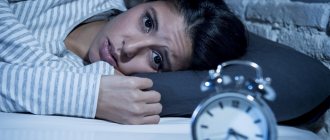Causes of insomnia in women 20, 30, 40, 50 years old
- Sleep disturbances . Falling asleep and waking up at different times disrupts circadian rhythms. As a result, insomnia occurs.
- Diseases . Various health problems can impair sleep.
- Stress . Difficulties at work and frequent conflicts negatively affect a woman’s sleep.
- Improper preparation for bed . The temperature in the bedroom, an uncomfortable mattress, excess noise and other factors have a bad effect on the quality of sleep.
- Wrong diet . Overeating at night increases gastrointestinal motility, which can make it difficult to fall asleep.
- Frequent drinking of coffee or tea . Both drinks contain caffeine, which stimulates the nervous system and interferes with sleep.
- Smoking before bed . Nicotine, like caffeine, has a stimulating effect. And even one cigarette before bed can cause insomnia.
- Taking stimulant medications . Some medications interfere with sleep. As a rule, this is stated in the annotation for the drug. However, you should not stop taking medications without consulting the doctor who prescribed them. Tell your doctor about your insomnia, maybe a specialist will change the medication.
- Aging . With age, physiological processes change in a woman’s body. Moreover, these changes affect the functioning of the brain, which leads to a decrease in sleep time.
- Pregnancy . Pregnant women experience hormonal changes, which can disrupt sleep.
Now let’s look at the main causes of insomnia in women.
Causes
If a person wakes up at night and tosses around in bed for a long time to fall asleep, we can talk about the development of insomnia.
Women are more emotional than men, so they are more likely to be violated. It is more difficult for them to abstract themselves from problems and relax their nervous system. In addition to psychological reasons, there are other prerequisites for the development of pathology.
Poor sleep hygiene
External factors influence how quickly you fall asleep. To prevent insomnia at night, it is important to create an atmosphere in the bedroom that is conducive to rest. Proper sleep hygiene is of great importance . It includes:
- Comfortable bed. For a comfortable rest, you need an orthopedic mattress, a small pillow, and linen made from natural materials. You should choose a blanket according to the season. It should not be cold under it in winter, and hot in summer.
- Temperature indicators. The bedroom needs to be ventilated every evening. Fresh air is the key to a sound, restful sleep. The room should not be damp. If the air is too dry, you need to use humidifiers.
- Silence and absence of light. To relax, you need to remove extraneous sounds, close the curtains in the bedroom tightly, and turn off the lighting sources.
Failure to follow these recommendations significantly worsens the quality of sleep.
Nutrition and its regime
An incorrect approach to nutrition can cause insomnia. Fatty dishes, marinades, and fast food overload the stomach and cause swelling. To fall asleep easily, it is recommended to eat small portions at a time and enrich your diet:
- fresh herbs;
- fiber;
- vegetables;
- boiled meat;
- fish.
You need to give up late dinners. The last meal can be 4 hours before bedtime.
In the evenings, you should not drink strong tea and coffee. These drinks excite the nervous system and cause insomnia even in women under 30 years of age.
Jet lag
Often the problem develops due to a failure of the biological clock. This happens when a person wants to sleep outside of school hours. With the onset of darkness, the body produces melatonin, a hormone that causes drowsiness. If, under the influence of external and internal factors, the production of melatonin decreases, insomnia begins to worry.
It is useful for a woman to get more rest, refuse to work at night, do exercises every day and carefully observe the daily routine, going to bed and waking up at a precisely set hour.
If the biological clock is disrupted, medical attention is required, which is prescribed on an individual basis..
Taking medications
Medications can disrupt sleep. Tranquilizers pose a great threat. They affect the nervous system and, with prolonged use, provoke insomnia. Prominent representatives of such drugs are amphetamines and inhibitors of the nervous system. Other medications also cause unpleasant symptoms:
- first generation antihistamines;
- antidepressants;
- drugs to lower blood pressure;
- codeine cough tablets;
- corticosteroids;
- bronchodilators.
Anxiety and stress
Nervous strain is considered the main factor for insomnia. To get rid of stress, some women uncontrollably take antidepressants and tranquilizers and only worsen the problem.
To get a good night's sleep, it is important to calm down. While lying in bed, you should not scroll through unpleasant life situations in your head. It's better to think about the good.
Walking in the fresh air can help cope with excessive excitement and stress. Before going to bed, you can take a warm bath with essential oils, drink chamomile tea or milk with honey.
Night terrors
Some people experience uncontrollable fear in the dark. They are afraid to fall asleep and dream. The condition is called hypnophobia. A prerequisite for the development of pathology is often the impressionability of women who are afraid of nightmares or are afraid of dying in their sleep.
The root cause of psychological illness in most cases lies in childhood. Domestic violence and scary books and movies can leave an imprint that will haunt you for years to come. Therapy for hypnophobia occurs under the guidance of a psychologist on an individual basis.
Impact of diseases
Sleep is a physiological process. Any disturbances in the functioning of the body can provoke disruptions leading to insomnia. Most often, the inability to fall asleep at night is a consequence of a mental disorder . Pathologies also contribute to:
- traumatic brain injuries;
- diseases of the nervous system;
- apnea syndrome.
Somatic diseases impair the functioning of the entire body and disrupt sleep. Signs of insomnia are observed in patients suffering from hypothyroidism, gastrointestinal pathologies, and bronchial asthma.
Snore
Snoring occurs not only in men, but also in women. It develops under the influence of:
- curvature of the nasal septum;
- excess weight;
- malocclusion;
- hormonal disorders;
- birth defects;
- severe fatigue.
Often snoring in women after 40 years of age appears due to age-related changes. Muscle tone weakens, tissues lose elasticity, and the airways become narrower . This causes snoring, sometimes accompanied by a short cessation of breathing. This condition does not allow you to fully rest and threatens insomnia.
Elderly age
In older years, melatonin production is weaker, and chronic diseases worry us.
After menopause, many women suffer from insomnia, the treatment of which requires a comprehensive approach. It includes physical therapy, diet, and taking medications aimed at eliminating the symptoms of menopause and chronic diseases.
Other reasons
The list of reasons why you may have difficulty falling asleep is wide. It includes:
- bad habits;
- obesity;
- endocrine diseases;
- pregnancy;
- helminthic infestation;
- infectious process.
Advertising:
Sleep disturbance
Recently, the average daily sleep duration has begun to decrease. The reasons for this are low physical activity, stress, bad habits, etc. Accordingly, in order to improve the quality and duration of sleep, you should remove everything that has a bad effect on your night's rest.
To restore your sleep pattern, exercise at least 2 times a week for 30 minutes. Moreover, it is better to finish classes at least 2 hours before bed. If you complete your workouts close to bedtime, you may experience stress-induced insomnia.
Next, you should give up cigarettes, since tobacco smoke does not promote sleep.
It's good if you can afford a nap during the day. However, if you have insomnia, it is better not to sleep during the day.
The most important rule for disrupted sleep patterns is to go to bed and wake up at the same time . Moreover, you should follow the regime even on weekends, when you don’t need to go anywhere in the morning.
To avoid health problems and deterioration in appearance, experts recommend that women sleep 8 hours a day.
There is an opinion that sleep between 11:00 pm and 3:00 am is the most beneficial. However, if your work schedule does not allow you to sleep during these hours, it is not necessary to adjust your sleep to this time. It is much more important to sleep a certain number of hours at the right time.
How to solve the problem of insomnia
It is necessary to find out why the sleep disturbances occurred. If they are psychological in nature, it is recommended to visit a psychotherapist. He will take the patient through a course of relaxation, cognitive psychology and psychoanalysis to find out what problem is tormenting the person’s consciousness and preventing him from sleeping. This will help get rid of psychological imbalance and restore normal sleep.
You can also follow some tips to improve your own sleep hygiene. The following is recommended:
- You need to choose a clear time for sleep and stick to it. It is better to get up and go to bed at the same hour every day.
- Eliminate the practice of sleeping during the day, be more mobile and active.
- Avoid eating immediately before bed.
- Do not drink caffeinated drinks or alcohol, stop smoking.
- Practice walking in the evening and doing exercises.
- Ventilate the bedroom in the evening.
Diseases associated with insomnia
Sleep disturbances are rarely associated with any illness. However, there are pathologies that are accompanied by insomnia in women. Let's list the main diseases:
- Depression . Consequence of chronic or acute stress. Almost always leads to sleep disturbances.
- Sleep apnea . Characterized by frequent pauses in breathing during sleep. Intermittent breathing at night ultimately leads to hypoxia, due to which brain function does not recover overnight.
- Diseases of the nervous system and traumatic brain injuries . Diseases and injuries in most cases disrupt brain function. This in turn provokes the development of insomnia. The most common diseases that are accompanied by sleep problems are dementia, Alzheimer's disease, Parkinson's disease, central nervous system tumors, etc.
- Hormonal diseases . Sleep disturbances occur in diseases of the thyroid gland, gynecological problems, diseases of the adrenal glands and other ailments of the endocrine system.
- Bronchial asthma and respiratory pathologies . Impaired respiratory function contributes to the development of insomnia.
- Gastrointestinal diseases . Heartburn, gastroesophageal reflux (reflux of stomach contents into the esophagus) and ulcerative lesions of the gastrointestinal tract indirectly disrupt sleep.
- Migraine . Recurrent headaches can lead to insomnia.
- Restless legs syndrome . Involuntary leg movements make falling asleep worse.
How does insomnia manifest?
Women are susceptible to hormonal changes associated with pregnancy, the menstrual cycle, and menopause. This feature makes them sensitive and contributes to insomnia at any age.
Up to 30 years old
Youth is a time when sleep problems are rarely observed. A healthy body produces melatonin in the proper amount, and the biological clock works without failures. Before the age of 30, insomnia is rarely associated with internal factors . Usually it is provoked by external preconditions:
- Irregular work schedule, when you have to stay awake at night. This disrupts the biological rhythm, the woman feels chronic fatigue and becomes irritable.
- Spending a long time at the computer. Monitor radiation negatively affects brain function. The nervous system is excited.
Internal causes of insomnia in a young woman include pregnancy, which causes hormonal changes and mental instability.
Overwork and stress force a young woman to toss and turn in bed for a long time and prevent her from falling asleep for several hours. If insomnia occurs before the age of 30, then in the morning it is difficult to wake up without the alarm ringing. Lack of proper rest at night contributes to drowsiness and fatigue in the morning.
From 30 to 40 years
In a healthy woman, the level of the sleep hormone has not yet been reduced. After 30 years, many people experience a midlife crisis, which negatively affects their night's rest.
For a forty-year-old woman, insomnia is a common symptom of professional and personal troubles. Troubles at work, problems in the family provoke emotional stress, which forces you not to close your eyes at night.
Features of insomnia at this age are manifested by mild anxiety. It is difficult for a woman to fall asleep in the evenings, and at night she wakes up from the slightest rustle.
From 40 to 50 years
During this period of time, the aging process begins, so physiological factors are added to the psychological factors of insomnia. Melatonin production gradually decreases, and the hormone is not always enough for proper sleep.
After 40 years, age-related hormonal changes begin, lasting several years, and by the age of 50, menopause occurs.
Women who have crossed the age of forty often suffer from insomnia. A feature of the pathology at this age is irritability in the evenings, pressure drops and hot flashes at night, which interfere with sleep.
After 50 years
In old age, insomnia becomes chronic. After 50 years, physical and mental activity decreases. Women are worried about loneliness, resentment towards children and grandchildren. Diseases of concern:
- arthrosis;
- angina pectoris;
- hypertension;
- ulcer;
- osteoporosis.
A combination of factors leads to the fact that a woman cannot sleep until late at night and gets up early in the morning broken and tired.
Insomnia is a common problem in old age . Night sleep becomes very sensitive. Often a woman falls asleep in the middle of the night and no longer sleeps, remembering her past life or trying to relieve the aching pain in her joints.
Stress as a cause of insomnia in women
Stress and its consequences in the form of depression can be placed in 1st place in the number of cases of insomnia among the fair sex. Trying to get rid of stress and speed up falling asleep, some ladies take sleeping pills. However, medications help only temporarily. Therefore, often after the end of the course, insomnia returns again. For this reason, sleep disorders need to be treated comprehensively together with a general practitioner.
To normalize sleep, it is recommended not to conflict with loved ones and colleagues, to play sports, meditate, communicate with friends, etc. To distract from work stress, find yourself a hobby that would captivate and delight you. For example, join a gym, take a makeup class, or do yoga. It all depends on your desire.
You should not immediately become addicted to antidepressants and “heavy” sleeping pills. First, try to improve your sleep in other ways. For example, through physical activity, meditation, etc.
If the measures described above do not relieve insomnia, go to an appointment with a somnologist.
How to treat insomnia?
Insomnia can be treated using traditional methods or by going to the clinic. When treating yourself, it is important not to harm your health even more and not to use strong psychotropic and hypnotic drugs on your own.
You should consult a doctor if you notice:
- inability to fall asleep after 30 minutes to an hour of being in bed without light sources around;
- frequent awakening without further opportunity to fall back to sleep;
- feel tired after waking up;
- symptoms last longer than a week or two.
There are three methods of treating insomnia that are combined with each other. Replacement therapy involves taking hormones in the form of tablets, which are taken before falling asleep and help normalize sleep. Psychotherapy and sleeping pills, which are prescribed by the doctor after a complete examination of the patient.
Are medications needed?
Medications should only be prescribed by a doctor and in severe cases of insomnia. They have a number of side effects that should be monitored by specialists. Many of the medications carry the risk of dependence and addiction.
Natural herbal medicines that have a mild sedative effect have a milder effect - these are valerian, motherwort tincture, Menovazin, Persen or Novo-passit. They can be used independently, but also with extreme caution and analysis of the instructions with contraindications.
Zolpidem and Zaleplon have virtually no side effects and help you fall asleep quickly.
Under no circumstances should this condition be treated by drinking alcohol.
Folk remedies
Folk remedies that can help normalize not too advanced cases of insomnia:
- dried bay leaves are added to the pillow on which a person suffering from insomnia sleeps;
- eating a small amount of onion half an hour before bedtime;
- drinking tincture of dill seeds or hop cones;
- 250 ml of warmed milk with honey before resting.
Gymnastics and massage for insomnia for women
One of the safest and most enjoyable ways to treat sleep disorders is massage. It is quite effective for insomnia that is not too severe, especially with aromatic oils.
Lavender oil is applied to the temples and lightly massaged into this area before bed. You can knead your feet with light circular movements for 20 minutes before falling asleep and when waking up.
Acupressure can be performed by anyone who does not have vascular pathologies, rashes or other skin damage, tumors or thrombophlebitis. This method involves massaging sleepy points on the body.
The duration of the method on one zone is up to three minutes. There should be no pain during the procedure.
The point located between the eyebrows, about 1 cm above the bridge of the nose, is warmed up. You need to press on it for a minute or two. The second point is located on the outside of the wrist near the little finger at the end of the wrist fold. It can be found by the depression between the tendons.
Chinese gymnastics is good for insomnia 10 minutes before falling asleep. Leaning on your back, you need to extend your arms and place them in different directions. Legs bend at the knees. You need to cross your knees and then place your left knee on top of your right. Take 10 smooth breaths on one side and the other.
Eating at night is bad for sleep
Many representatives of the fair sex cannot sleep after a hearty dinner. However, poor diet is rarely the true cause of insomnia in women. Nutrition is just an additional factor that is often combined with more serious causes of insomnia.
However, it is better not to overeat at night and monitor your caloric intake. Eat 5-6 times a day in small portions. So, the body absorbs food better, which is good not only for sleep, but also for maintaining your figure. You should finish dinner 2 hours before going to bed. In this case, you will not go to bed with a full stomach and will not feel hungry while falling asleep.
To get rid of insomnia, it is better not to drink tea or coffee after lunch. In addition, it is not recommended to consume these drinks in the morning. Tea and coffee contain caffeine, a nervous system stimulant. Excess caffeine in the body increases brain activity, which makes it difficult to fall asleep.
Drinking heavily a few hours before bedtime also does not contribute to proper rest. A large amount of fluid in the body increases the functioning of the kidneys, which is why you will often get up to go to the toilet at night.
What is insomnia and why is it dangerous?
Every person experiences insomnia (as lack of sleep is called in medicine) at least once in their life. However, spending a night without sleep or several such nights does not indicate a problem. Somnologists who treat insomnia and related disorders consider their patients to be people who for a long time, several nights a week, have difficulty falling asleep or cannot get enough sleep due to frequent awakenings for no reason.
Healthy sleep consists of several cycles lasting about 1.5-2 hours, they are called the phases of rapid (deep) and slow (shallow) sleep. With insomnia, some phases are absent. For proper rest, a deep phase accompanied by dreams is important.
Occasional sleep disturbances can be compensated for by sleeping a little longer the next night. However, if a person experiences sleepless nights for several weeks, then a chronic form of insomnia sets in, which is dangerous for physical and mental health. Insomnia cannot be ignored; sleep will not be restored on its own, and taking medicinal herbs or sleeping pills independently chosen at the pharmacy will only aggravate the protracted disorder.
Experts know what accumulated lack of sleep can lead to, it leads to:
- to a decrease in immunity, as a result of which a person is more often exposed to infectious diseases;
- to absent-mindedness and inability to concentrate on solving work and life problems;
- after a sleepless night, performance decreases, a person feels tired, apathetic, and has severe headaches;
- aggressiveness and irritability increases, the ability to adequately assess conflict situations is lost;
- the brain does not have time to rest and requires increased nutrition, the person begins to abuse high-calorie foods, gains weight, while volitional processes are suppressed;
- to loss of attractiveness, external signs of lack of sleep - red eyes and dark circles under them, swelling of the face, dull skin, wrinkles, dry lips, nervous tics, tremors of the limbs.
How to properly prepare for bed
The cause of insomnia in women may be the conditions in which sleep takes place. These include an uncomfortable mattress, bright light, noise, uncomfortable temperature in the bedroom, and an incorrectly selected blanket and pillow.
Proper organization of sleep will help solve the problem of insomnia. To begin, purchase an orthopedic pillow that supports your head and neck in the desired position. By choosing the right pillow, you will avoid neck pain in the morning. Read more about how to choose a pillow for sleeping here.
an orthopedic mattress is important . An even position of the spine on the mattress improves the quality of sleep and prevents back pain after getting up. What to do if your back hurts after sleep, read this article.
Bed linen should be made from natural materials, such as cotton or silk. As a rule, natural products are best suited for sound sleep.
Along with preparing the place to sleep, take care of the climate in the bedroom. The cause of insomnia in women may be too dry or excessively humid air. In the case of dry air, the problem will be solved by a special humidifier , which will automatically spray moisture in the bedroom. Ventilating the bedroom before going to bed works well to combat humid air. By the way, if it’s not too cold outside at night, sleep with the window open.
The temperature in the bedroom during sleep should be 16-20 degrees Celsius . This will ensure the most sound sleep possible. In this case, you need to sleep under a warm blanket so as not to freeze at night.
When it is very hot and stuffy at night, you can turn on the air conditioner, setting the recommended air temperature to 16-20 degrees. However, if you have a small child or often get colds, you still shouldn’t the air conditioner
Earplugs made of polypropylene, polyurethane or silicone will eliminate extraneous sounds If you are bothered by excess light in the bedroom, buy thick curtains. By choosing the right curtains, you can sleep in complete darkness, even if the sun is shining brightly outside the window.
Insomnia that occurs in women and its characteristics
It has been established that most often the female half of the population suffers from insomnia. This is due to the fact that by their nature women are more emotional and react violently to the occurrence of any non-standard situation. In addition, the development of the disorder is associated with the physiological characteristics of the female body: changes in hormonal levels and the functioning of the nervous system.
Drugs that keep you awake
- Sleeping pills and tranquilizers . It would seem that these remedies, on the contrary, should combat insomnia. In principle, this is true. However, abruptly stopping these medications can seriously disrupt sleep.
- Stimulants . Caffeinated drugs and other drugs that stimulate the nervous system often cause insomnia in women.
- Drugs that normalize blood pressure . Means to increase or decrease blood pressure affect vascular tone. And this often provokes sleep disturbances.
- Antihistamines . Allergy medications, especially the first generation, often lead to sleepless nights.
- Antidepressants and neuroleptics . The active ingredients in these drugs interfere with brain function and change sleep cycles. Among antidepressants, the side effect of insomnia is more common in the subgroup of SSRIs - selective serotonin reuptake inhibitors.
- Steroids . Muscle-building drugs can also cause insomnia. This also includes corticosteroids - medications for the treatment of inflammatory diseases, skin diseases and other serious pathologies. Taking these medications can also be accompanied by sleep disturbances.
- Medicines for bronchial asthma . They eliminate bronchospasms, but can cause insomnia.
General understanding of insomnia
Insomnia is a group of disorders characterized by poor quality and short duration of sleep.
In some cases, these signs occur separately. We can talk about insomnia if the process is repeated for a long time, otherwise doctors note a transient disorder associated with external factors. The disorder is quite common - about 40% of the adult population of the planet suffers from parasomnia. The main criteria by which this pathology can be determined are:
- prolonged process of falling asleep;
- superficial intermittent sleep;
- frequent awakenings (more than 4 times);
- short duration of sleep (going to bed late at night, a person wakes up early in the morning);
- fatigue and weakness, lack of strength and energy;
- decreased performance.
It is important to know! Insomnia can be either situational (short-term) or last for a long period of time. According to statistics, in 10-15% of people it causes clinical changes in the condition that worsen the quality of life.
Apnea and snoring are factors of insomnia
Both pathologies are observed in women no less often than in men. And most often, snoring or apnea occurs in older women, as well as in overweight women.
Apnea is a condition in which a person stops breathing several times during the night. Moreover, one can hold one’s breath up to 400 times during the entire sleep period . The causes of apnea are usually associated with the anatomical features of the upper respiratory tract, weakening of the muscles of the palate, obesity, etc.
Snoring often precedes apnea. Snoring itself occurs due to narrowing of the airways in the nasopharynx. When air passes through this anatomical area, vibration occurs, which is accompanied by a characteristic sound.
Snoring often leads to swelling of the nasopharynx, which is precisely the cause of apnea in women. Obstructive apnea , in which the airways are blocked, increases the risk of developing cardiovascular pathologies. For example, frequent pauses in breathing during sleep provoke the appearance of hypertension, coronary heart disease, and angina pectoris . And these diseases, in turn, increase the risk of heart attack and stroke.
The causes of insomnia in women in the form of snoring and apnea, among other things, worsen their well-being during the day. Due to daytime sleepiness, performance and motivation for any activity decrease.
Treatment of apnea in women should be comprehensive and include: consultation with a somnologist, polysomnography, normalization of body weight, increased physical activity, etc.
Read more about how to get rid of apnea in this article.
Alarming symptoms
You can often hear people say, “I had insomnia today.” In fact, this expression is meaningless. Insomnia is not a one-day problem, but a serious disease that requires precise determination of the cause of its development and sometimes long-term complex treatment. Only a neurologist or somnologist can make such a diagnosis, based on the constant presence of the following symptoms:
- the process of falling asleep lasts longer than one hour;
- sleep is constantly interrupted, up to several times a night;
- a person is not able to fall into the rapid phase of sleep;
- the ability to remember decreases;
- having difficulty concentrating;
- there is a feeling of constant fatigue;
- performance decreases noticeably;
- loss of interest in favorite activities;
- there is unreasonable aggressiveness;
- constant irritability, nervousness.
And if men are able to hide such problems from others for a long time, then in women they usually show up immediately and much stronger. External manifestations of insomnia are a dull “absent” look, bruises or dark circles under the eyes, pale skin.
Only these symptoms, and regularly recurring for at least 2-3 weeks, can become a cause for serious concern and a visit to the doctor. If you simply cannot fall asleep or sleep restlessly even for several nights in a row, you should first pay attention to external reasons.
Causes of insomnia in the elderly
With age, the hormonal levels in the female body change. And this is usually associated with menopause . In addition, brain function changes in older people, which in turn affects circadian rhythms. That is why after 55 years the duration of sleep gradually decreases.
Diseases that appear in old age can also cause insomnia. Such diseases, for example, are hypertension and pathologies of the nervous system .
To treat insomnia in women aged 55-60 years, an integrated approach is required. First, you must visit a doctor who will prescribe therapy. Well, after that, start implementing the specialist’s recommendations. Treatment typically includes physical therapy, breathing exercises, chronic disease management, and sleep medications.
Psychological and neurological reasons
The psychological reasons that can provoke insomnia in women can be listed endlessly: from worries about a purchased/unpurchased new dress to stress caused by parting with a loved one. Here everything depends on the emotionality of the woman herself and on her ability to adequately respond to stressful situations.
Doctors consider the most serious factors provoking insomnia (and not short-term sleep disorders) in women:
- frequent or prolonged stress;
- protracted conflict situations;
- separation from a loved one;
- engagement and wedding preparations;
- pregnancy and childbirth;
- change of place of work or residence;
- the need to keep an important secret;
- loss of a loved one.
The inability to disconnect from experiences even in a dream often provokes the appearance of nightmares, which can be repeated night after night until the problem is solved in reality. Many women cannot fall asleep simply because they are lying in bed waiting for a repetition of a terrible dream, and the brain, naturally, receives exactly what it is tuned to.
The reason for lack of sleep in many women is the fear of insomnia. In the evening, they prepare themselves for difficulty falling asleep, and when they cannot switch off quickly, they convince themselves that insomnia really exists.
In this case, only a qualified psychologist, properly conducted meditation or systematic yoga classes can help. As a complement to them, folk remedies for insomnia work great. But using only folk recipes will not bring tangible results.
An effective drug that can significantly speed up falling asleep and provide the body with proper rest, without disturbing the sleep cycle, is the natural remedy for insomnia “Sonylux”. It is created on the basis of extracts of 32 medicinal herbs with the addition of such unique biologically active substances as beaver stream and Alishan gab fruits.
"Sonylux" relieves nervous tension, helps cope with stress, makes it easier to fall asleep, eliminates irritability, relieves fears and nightmares. Unlike traditional sleeping pills, Sonilyuks is not addictive and has virtually no contraindications.
The most difficult form of insomnia to treat is serious neurological disorders. Panic attacks and nightmares are constant companions of depression and mental illness.
Half of people suffering from schizophrenia and almost 2/3 of patients with affective mental disorders suffer from insomnia. This requires both individually selected drug treatment and psychological techniques: hypnosis, psychotherapy, etc.
Sleep disorders in pregnant women
Every second pregnant woman experiences insomnia during pregnancy. Lack of night rest immediately affects the well-being of the expectant mother. With regular sleep disturbances, chronic fatigue develops, which makes it difficult to do even household chores.
Insomnia during pregnancy reduces alertness, which is why a pregnant woman can easily get injured , for example, while walking or taking a shower.
Sleep disturbances are often accompanied by irritability due to the inability to fully rest at night.
Treatment for insomnia in pregnant women includes:
- Refusal of daytime sleep . If you sleep during the day and have difficulty falling asleep in the evening, avoid taking an afternoon nap. Rest during the day disrupts natural sleep patterns. Therefore, if you want to take a nap after lunch, overpower yourself, wait until 20-21 pm and go to bed.
- We protect ourselves and the baby from stress . There is no need to quarrel with anyone during pregnancy. In addition, do not talk about emotional topics with family members and do not watch heartbreaking melodramas before bed. Both of these are not conducive to good sleep.
- Less fluid at night . During pregnancy, the fetus puts pressure on the bladder, which is why the woman often goes to the toilet in the last stages. So, to avoid frequently having to get up to go to the bathroom in the middle of the night, drink less fluid before bed.
- Sleep in a comfortable position . The correct sleeping position is the key to energy the next day. Read about the best position to sleep in in this article.
After 50 years
The causes of insomnia in young women only worsen with age: chronic fatigue accumulates and health deteriorates.
And if a young girl does not attach serious importance to the problems associated with sleep disorders and does nothing to eliminate them, then with age her insomnia becomes chronic.
It is especially dangerous for single women with a pronounced desire to take care of someone and who live not with their own problems, but with the problems of children, for whom such care is often a burden. This is also facilitated by factors such as:
- decreased social, mental and physical activity;
- age-related diseases;
- taking all kinds of medications;
- unstable psycho-emotional state.
Characteristics of insomnia
If problems with night rest bother a person for some time and then disappear, then in this case we need to talk about the influence of external factors. It is important to understand that sleep time is completely individual for each person who suffers from insomnia, so relying on this indicator alone is prohibited.
Doctors do not classify all sleep disorders in humans as insomnia. Insomnia can be diagnosed only if a woman complains of characteristic problems for two to three weeks. For such a violation there are special signs:
- difficulty falling asleep, sleep time exceeds one hour, provided that the woman goes to bed at the set time;
- regular waking up at night, which makes it difficult to fall asleep afterwards;
- The general sleep phase is quickly shortened, there are never any dreams.
Lack of sleep at night negatively affects daytime hours, which leads to various ailments. These include:
decrease in overall human performance;- problems with concentration, inattention is characteristic;
- the patient regularly feels lethargic;
- strong aggressiveness appears, which can occur for no particular reason;
- difficulty remembering;
- severe nervousness, rapid irritation;
- a person loses interest in hobbies and accepted entertainment.
Somnologists (specialists who deal with sleep disorders) think that therapy for eliminating insomnia and its causes are strongly interconnected; sleep difficulties can be eliminated only by getting rid of the main causes.
For women aged 18 to 60 years, the optimal sleep time at night varies from 7 to 9 hours. For women over 60 years of age, nightly sleep should not exceed 5-8 hours.
Treatment of chronic insomnia
Before treating the insomnia itself, doctors will need to determine the cause. If the primary form occurs, sleep disturbance will be treated. But in the presence of secondary insomnia, it will be necessary to first eliminate those pathologies that led to the formation of insomnia in the patient. The person’s situation in this case is complicated by the fact that secondary type insomnia, which lasted more than 3 months, begins to develop as an independent pathological process. It does not disappear if the underlying disease is treated.
How to cure chronic insomnia with medications?
If you have chronic insomnia, you should not take medications on your own. Even those that can be bought without a doctor's prescription must be prescribed and taken in the prescribed dosage. Treating a chronic condition with sleeping pills is less effective than treating short-term cases.
There are rules that every doctor must follow when prescribing medications to his patient, these are:
- minimum dosage;
- intermittent doses of 1 drug;
- short course of medication;
- constant dose reduction and gradual withdrawal of prescribed medications;
- elimination of the rebound effect after drug withdrawal.
Most often, medications are prescribed for the primary form of the disease if psychotherapy sessions do not help. To speed up sleep, the drugs Zolpidem and Zaleplon are prescribed. To eliminate episodes of awakening at night, benzodiazepines are recommended.
The duration of action of the drugs is selected based on the most common time of waking up:
- for sleep problems, medications with a short duration of action are prescribed in the first half of the night;
- if the patient wakes up in the second half of the night, then he is recommended to take medications with an average duration of action.
The disadvantage of benzodiazepines is that they become quickly addictive and have side effects (drowsiness, amnesia, etc.). More often, safer cyclopyrrolones (Zopiclone, etc.) or imidazopyridines (Zolpidem, etc.) are prescribed. To normalize the circadian rhythm, adaptogens (for example, melatonin preparations) are used.
Diagnosis and treatment of sleep cycle disorders
If a person is tormented by poor sleep, then one cannot simply leave the problem. The following complaints indicate a cycle disorder:
- “I often wake up at night”;
- “I wake up at night and can’t sleep”;
- “I wake up very early in the morning and don’t get enough sleep.”
If you have such complaints, you should contact your doctor. a facility where causes and treatment will be determined.
Who to contact
Taking into account the question of who to contact if sleep patterns are disturbed, then to diagnose a sleep problem, it is customary to visit a somnologist who specializes in problems and ailments associated with the dream cycle. If there is no doctor, then contact a therapist or neurologist
These specialists will tell you how to restore your sleep. If the problem turns out to be more serious, then visit a somnologist.
Sleep problems are diagnosed in a special medical center. institution. Different methods are used for this:
Polysomnography. The session is carried out in a special room where special equipment is located
At the time of manipulation, the patient is under special attention of laboratory technicians during sleep. Meters are attached to the patient, which determine the frequency of inhalations and exhalations, pulse, heartbeat, and electrical activity of the cerebral cortex.
Based on the results obtained, the somnologist will determine the cause of the problem. The specialist will tell you what to do and how to restore your sleep pattern.
Study of average sleep latency. This technique is used if there is suspicion of hypersomnia or narcolepsy.
After determining the causes of sleep disturbances, treatment is prescribed based on the results.
How to restore sleep patterns
These diagnostic measures help the doctor determine the cause of the disorder, and based on this, he will tell you how to deal with the problem. Poor sleep at night in an adult can be treated with the following remedies:
- medications of varying degrees of impact with hypnotic effects;
- antidepressants, if the root cause is a prolonged form of depression;
- antipsychotics with a sedative effect, if the manifestations of disorders are severe;
- sedatives are prescribed for those who are nervous;
- medications with a vasodilator effect in combination with mild hypnotics, if heart rhythm disturbances or angina pectoris become the cause of restless sleep in an adult, treatment is carried out immediately.
Everyone should remember what the consequences of sleep disturbances are and why problems with falling asleep are dangerous. Therefore, it is strictly forbidden to engage in spontaneous selection of drugs. Sleeping pills, when taken for a long time, can cause addiction, which leads to problems in the functioning of the nervous system. This only makes all the problems worse.
If bad dreams are caused by worries and worries, then 20 minutes before the event it is recommended to drink tea with a sedative effect, a decoction, or an infusion of medicinal plants. Chamomile tea or prepared with mint, lemon balm and their leaves will cope perfectly with the problem.
At the pharmacy you can buy motherwort tincture, which is an excellent remedy for insomnia. At home, you can prepare a drink from motherwort yourself and drink it throughout the day. Elderly people should drink a decoction of chamomile, which will correct the functioning of the heart and eliminate heart rhythm disturbances.
What to do about sleep problems
Most often, sleep disturbance is triggered by minor factors such as eating at night, stress, or intense sports. Therefore, you should not neglect the prevention of sleep disorders. It involves following simple recommendations:
- contrast bath at night;
- light relaxing massage;
- creating cozy conditions for dreams;
- stop eating 2 hours before bedtime;
- do not perform activities that may negatively affect the nervous system;
- before dreams, drink a cup of warmed milk;
- elimination of irritants such as noise, light.
All of the above tips will help you overcome powerlessness after a hard day, help you calm down and relax.
Treatment with folk remedies
Recipes for maintaining sleep and combating insomnia:
- adherence to diet;
- maintaining a sleep schedule;
- physical activity, sports;
- exclusion of tonic drinks and heavy meals after 18 hours;
- cycling, walking short walks in the evening.
Helps you relax before bed:
- meditation;
- reading;
- taking a bath;
- light massage.
To cope with short-term, mild insomnia, it is recommended:
- ventilate the room before going to bed;
- listen to soothing music;
- change the bed to a comfortable one.
If you have problems sleeping, you will have to avoid strong alcohol. A quarter glass of wine helps you relax and fall asleep. But too much alcohol means getting a headache in the morning, dry mouth and a feeling of weakness, which with constant practice only worsens the patient’s condition and leads to chronic insomnia.
Popular wisdom suggests fighting sleep problems with decoctions and infusions. A common tasty option is to drink a glass of milk heated to 37 degrees, sweetened with a spoon of honey at night. Another useful remedy is chamomile decoction.
Pharmacies sell tinctures of motherwort and valerian root. The positive effect of decoctions of dandelion, hop cones, and heather is known. It is better to brew your own herbs collected in ecologically clean areas. If this is not possible, buy dried plants at the pharmacy
When choosing, pay attention to what the contraindications are, whether there are any side effects
- Add a tablespoon of dried chamomile inflorescences to 0.3 liters of water.
- The herb is poured with heated water, placed in a water bath, waited for 20-30 minutes, then carefully filtered.
- It is recommended to drink chamomile infusion an hour before going to bed.
In addition to the tablets and pills prescribed by the doctor, folk remedies can be used to treat insomnia. Here are the most effective ones:
- Aroma bath with fir needles. Needles have a whole range of beneficial properties, one of which is a positive effect on the psyche. To prepare a relaxing bath, pour boiling water over fir needles in the morning and leave until evening. Within a day the broth will turn dark brown. It must be poured into the water prepared for bathing. Now you can take a bath.
- Kefir with honey. It perfectly helps you relax and fill your body with essential nutrients. The remedy is very simple. Regular store-bought kefir will do, in which you need to dissolve a spoonful of natural honey. You need to drink it before bed.
- Soothing decoction of medicinal herbs. To prepare it, you need to take 2 parts of valerian herb, 3 parts of motherwort, the same amount of mint leaves and 2 parts of hops. Everything is steamed with boiling water for 15 minutes. When the broth has cooled, drink 2 tbsp. l. three times a day. Perfectly calms, restores the nervous system, eliminates insomnia.
Causes of insomnia
Depending on the etiological factor, chronic insomnia is divided into primary and secondary.
Primary occurs as an independent pathology under the influence of external and internal factors.
Secondary is not an independent disease, but a consequence of other diseases, for example, cardiovascular, endocrine.
Secondary dyssomnia often accompanies a woman in the second half of pregnancy due to changes in hormonal levels.
The main causes of chronic insomnia are physiological and psychological.
The first are associated with somatic diseases or organic changes in the nervous system. Among them:
- Head injuries.
- Osteochondrosis and other pathologies of the spine.
- Infectious diseases.
- Cardiovascular disorders.
- Endocrine pathologies.
- Diabetes.
- Asthma.
- Epilepsy.
- Brain tumors.
- Mental illnesses.
- Difficulty breathing during sleep, apnea.
- Restless legs syndrome.
- Pain syndrome of various origins.
- Skin itching.
- Old age, at which the synthesis of the sleep hormone melatonin is reduced.
Psychological causes of insomnia:
- Stress, anxiety.
- Time zone change.
- Violation of the daily routine, for example, due to night shift work.
- Poor sleep hygiene (uncomfortable bed, stuffy room).
- Too intense emotional experiences in the evening: watching a movie, playing on the computer, sorting out relationships.
- Drinking tonic drinks in the evening (coffee, tea, energy drinks, alcohol).
Sleep disturbances can also be caused by taking certain medications:
- hormonal;
- nootropics;
- neuroleptics;
- anticonvulsants;
- antiparkinsonian (levodopa).
Approximately 15% of cases of insomnia are idiopathic, that is, they arise for unknown reasons.
The transition of dyssomnia to the chronic stage is often facilitated by the patient’s incorrect actions. He tries to compensate for sleep at night by napping during the day, drinking alcohol or sleeping pills without a doctor’s prescription.
Difficulties by period of life
Throughout their lives, women very often face the problem of night rest during the menstrual cycle and before it.
Doctors explain this process by strong hormonal changes during these periods of time. Very often, difficulties with sleep are also accompanied by other disturbances in a woman’s psychological activity: body fatigue, nerves, stress, worries, difficulties with her significant other. Experts associate the presence of proper and deep sleep with the production of a special hormone by the human body. Before the age of forty, it is reproduced in the required quantity, in which case other reasons will affect the quality of sleep. After forty years, the disorder begins to acquire physiological factors - a lack of hormone production.
Experts have identified groups of sleep disorders depending on the woman’s age group. The reasons for the development of malaise in girls under the age of thirty include:
- Spending a long time at the computer or TV screen in the evenings. As a result, this leads to disturbances in time orientation, so the body simply does not have time to fully prepare for a night's rest.
- During pregnancy. When carrying a baby, a woman's hormones begin to be produced differently. In this case, there are regular mood swings, as well as difficulty going to bed.
Factors that influence sleep disturbances in women under the age of thirty include difficulties at home, irregularities in the menstrual cycle, regular stress, very tight nightgowns, and excessive physical activity during the day. Factors that are expressed in the excitation of the central nervous system, the woman’s experiences, and the level of the hormone in the body are within normal limits.
At the age of thirty to forty years, insomnia occurs due to personal experiences, they cannot be attributed to problems with hormonal levels:
- difficulties at work, unfulfilled dreams, scandals in relationships with your man or in the family;
- a midlife crisis occurs. At this time, a woman begins to reconsider all her priorities in life and changes her values.
Insomnia before menstruation occurs in a more pronounced form.
The causes of insomnia in women over 40 years old are considered more physiological than mental:
- The production of hormones deteriorates; their quantity is simply insufficient for proper rest.
- A woman’s reproductive function decreases; during menopause, difficulties arise with the reproduction of hormones.
- The well-being of women worsens, their health is impaired, and somatic and neurological diseases occur.
Psychological factors include severe anxiety and stress.
Causes of insomnia in women over 50 years of age:
- reduced immunity;
- increased irritability and stress;
- emotional instability.
At this time, the amount of the hormone continues to actively fall, due to worries, the development of physical ailments becomes even clearer.











